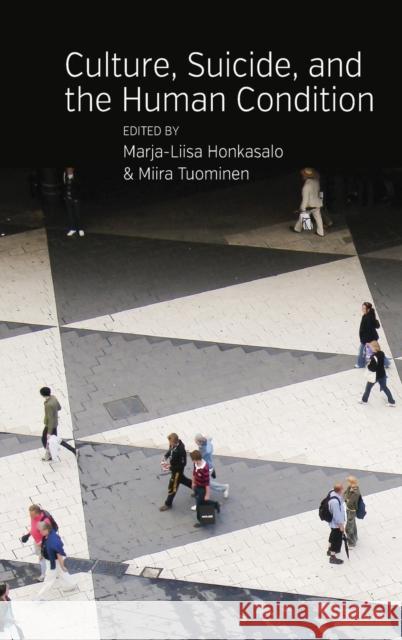Culture, Suicide, and the Human Condition » książka
Culture, Suicide, and the Human Condition
ISBN-13: 9781782382348 / Angielski / Twarda / 2014 / 230 str.
Suicide is a puzzling phenomenon. Not only is its demarcation problematic but it also eludes simple explanation. The cultures in which suicide mortality is high do not necessarily have much else in common, and neither is a single mental illness such as depression sufficient to lead a person to suicide. In a word, despite its statistical regularity, suicide is unpredictable on the individual level. The main argument emerging from this collection is that suicide should not be understood as a separate realm of pathological behavior but as a form of human action. As such it is always dependent on the decision that the individual makes in a cultural, ethical and socio-economic context, but the context never completely determines the decision. This book also argues that cultural narratives concerning suicide have a problematic double function: in addition to enabling the community to make sense of self-inflicted death, they also constitute a blueprint depicting suicide as a solution to common human problems. Marja-Liisa Honkasalo is Professor of Culture and Health at the University of Turku, Finland. She has worked as Academy of Finland Research Fellow at the University of Helsinki, at the Helsinki Collegium for Advanced Study and as Professor in Medical Anthropology at the University of Linkoping, Sweden. She has been a visiting scholar at Harvard University and at La Sapienza, Rome. She has published monographs, edited volumes and numerous articles in international series on illness and death and has been awarded The Steve Polgar Professional Prize for the best article published in 2009 by the Society of Medical Anthropology of the American Anthropological Association (AAA). Miira Tuominen is a University Lecturer in philosophy (University of Jyvaskyla) and currently works as an Academy of Finland Research Fellow. She has published two monographs Apprehension and Argument: Ancient Theories of Starting Points for Knowledge (Springer 2007) and Ancient Commentators on Plato and Aristotle (Acumen/University of California Press 2009) and numerous articles. She has worked at two centers of excellence in Finland, at the Centre for Advanced Study (Norwegian Academy of Science and Letters), and at the Helsinki Collegium for Advanced Study.
Suicide is a puzzling phenomenon. Not only is its demarcation problematic but it also eludes simple explanation. The cultures in which suicide mortality is high do not necessarily have much else in common, and neither is a single mental illness such as depression sufficient to lead a person to suicide. In a word, despite its statistical regularity, suicide is unpredictable on the individual level. The main argument emerging from this collection is that suicide should not be understood as a separate realm of pathological behavior but as a form of human action. As such it is always dependent on the decision that the individual makes in a cultural, ethical and socio-economic context, but the context never completely determines the decision. This book also argues that cultural narratives concerning suicide have a problematic double function: in addition to enabling the community to make sense of self-inflicted death, they also constitute a blueprint depicting suicide as a solution to common human problems.Marja-Liisa Honkasalo is Professor of Culture and Health at the University of Turku, Finland. She has worked as Academy of Finland Research Fellow at the University of Helsinki, at the Helsinki Collegium for Advanced Study and as Professor in Medical Anthropology at the University of Linköping, Sweden. She has been a visiting scholar at Harvard University and at La Sapienza, Rome. She has published monographs, edited volumes and numerous articles in international series on illness and death and has been awarded The Steve Polgar Professional Prize for the best article published in 2009 by the Society of Medical Anthropology of the American Anthropological Association (AAA).Miira Tuominen is a University Lecturer in philosophy (University of Jyväskylä) and currently works as an Academy of Finland Research Fellow. She has published two monographs Apprehension and Argument: Ancient Theories of Starting Points for Knowledge (Springer 2007) and Ancient Commentators on Plato and Aristotle (Acumen/University of California Press 2009) and numerous articles. She has worked at two centers of excellence in Finland, at the Centre for Advanced Study (Norwegian Academy of Science and Letters), and at the Helsinki Collegium for Advanced Study.











